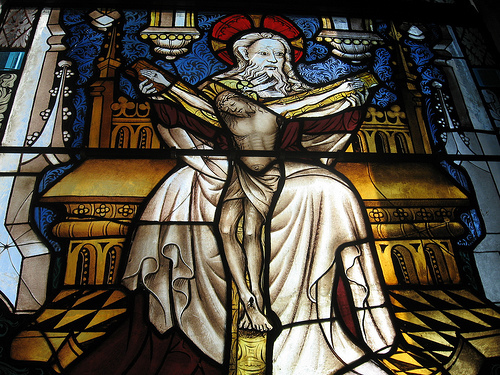We run our website the way we wished the whole internet worked: we provide high quality original content with no ads. We are funded solely by your direct support. Please consider supporting this project.

Was Jesus Abandoned by the Father on the Cross?
As Jesus hung on the cross, he cried, “Eli, Eli, lema sabachthani?” (Mt 27:46). This is the cry of our God who stooped to the furthest possible depths to experience his own antithesis, as the all-holy God becomes the sin of the world (2 Cor 5:21) and the perfectly united God becomes the curse of our separation from God (Gal 3:13).
Not surprisingly, this cry has always troubled theologians who were invested in preserving the classical understanding of God’s impassibility and immutability. How could God the Son truly experience abandonment from the Father if the Trinity is “above” suffering and “above” experiencing any kind of change? Hence, to insolate the divinity of Jesus from any suffering and change, the general way classical theologians have interpreted Jesus’ desperate cry was to argue that it arose out of his experience as a full human being, not his divinity. Among other problems, this interpretation calls into question the unity of the person of Jesus Christ and thus borders on Nestorianism. Not only this, but if God himself did not experience change and suffering on the cross, one is hard pressed to see how Jesus’ experience of change and suffering actually reveals God—let alone constitutes the quintessential revelation of God!
In more recent times a number of scholars have argued that Jesus was quoting the first line of Psalm 22. Since Psalm 22 ends on a note of hope in God’s redemption (vss. 22-31), some have suggested that Jesus’ apparent cry of despair might actually have been an expression of confidence that his abandonment was going to be temporary and that his Father would ultimately vindicate him.
But even if Jesus was alluding to the entire Psalm and was confident he would eventually be restored, this does not negate the truth that he was genuinely experiencing God-forsakenness and was, in his supremely tormented state, even experiencing confusion as to why it was happening.
It is not merely that Jesus experienced genuine God-forsakenness, he was in fact genuinely forsaken, as a number of theologians and NT scholars have emphasized in recent years. James Edwards, for example, says that on the cross, “Jesus is wholly forsaken and exposed to the horror of humanity’s sin.” This horror, he adds, is “so total that in his dying breath he senses his separation from God.”
At the same time, the unity of the Trinity could not be temporarily severed. If God’s eternal essence is the perfect loving unity of the Father, Son and Holy Spirit, then any suggestion that this perfect unity could be “severed,” even for a moment, would, by definition, entail that the Trinity could conceivably cease to exist. At the very least, if the “innermost life of the Trinity” could conceivably be threatened, the union of the three Persons must be understood to be a contingent, rather than a necessary, reality. And in this case, we cannot claim that God’s very essence is the loving union of the three Persons.
We can simultaneously affirm the ongoing, unbroken unity of the Trinity while also affirming the authenticity of Christ’s cry, on the other, if we simply remember that that this separation was entered into by all three divine Person’s out of love for human kind and for one another. As paradoxical as it sounds, the anguished separation of the Father and the Son on the cross constitutes the quintessential expression of the loving unity of the Father and the Son. Indeed, the unsurpassable cost of this divine separation expresses the unsurpassable perfection of the love of this divine union.
Perhaps the best way of thinking about this is to distinguish between the love and unity that the three divine persons experience, on the one hand, and the love and unity that defines God’s eternal essence, on the other. We could say that on the cross, the former was momentarily sacrificed as an expression of the latter. That is, the three divine Person’s sacrificed their previously uninterrupted experience of perfect love and union in order to express the perfect love and union that defines them as God.
Image by jlwelsh via Flickr.
Category: Q&A
Tags: Abandonment, Cross, Jesus, Love, Trinity
Topics: Atonement and The Cross
Related Reading

On Attending to the Light in Darkness
Joe Spurr via Compfight Donald Miller has posted a reflection on his Storyline blog about highlighting goodness and thereby pointing to Jesus in the aftermath of events such as the bombing in Boston this week. We want to emphatically declare together that “an enemy has done this” (Matt 13:28). But we also want to be a people…

Getting Honest about the Dark Side of the Bible
Eddy Van 3000 via Compfight While most of the Bible exhibits a “God-breathed” quality, reflecting a magnificently beautiful God that is consistent with God’s definitive revelation on the cross, we must honestly acknowledge that some depictions of God in Scripture are simply horrific. They are included in what is sometimes called “the dark side of…

Not the God You Were Expecting
Thomas Hawk via Compfight Micah J. Murray posted a reflection today titled The God Who Bleeds. In contrast to Mark Driscoll’s “Pride Fighter,” this God allowed himself to get beat up and killed while all his closest friends ran and hid and denied they even knew him. What kind of a God does this? The kind…

Podcast: Why Did Jesus Need to Be Baptized?
Greg submerges himself in the topic of Jesus’ baptism. http://traffic.libsyn.com/askgregboyd/Episode_0078.mp3

How Are We To Love the Soldiers of ISIS?
Over the last several weeks I’ve received some form of this question almost every day. In some cases the question is asked rhetorically, as though the very question exposes the absurdity of suggesting we are to love this terroristic group. Other times the question is asked with a pragmatic twist. One person recently said to…

The Final Battle in Revelation
I will conclude this series on the violent imagery in Revelation by addressing the infamous eschatological battle scene found in 19:11-21, for it is this graphically violent section of Revelation that is most frequently appealed to by those who argue against the claim that Jesus reveals an enemy-loving, non-violent God that is unconditionally opposed to…
